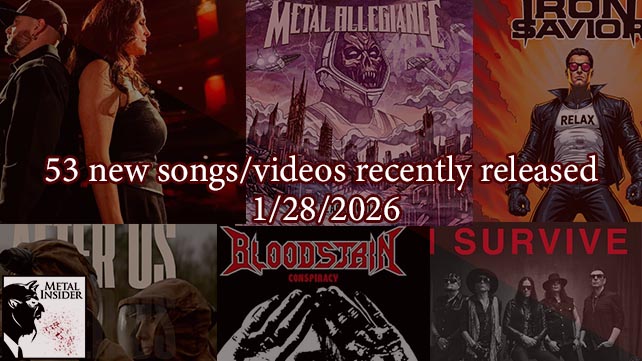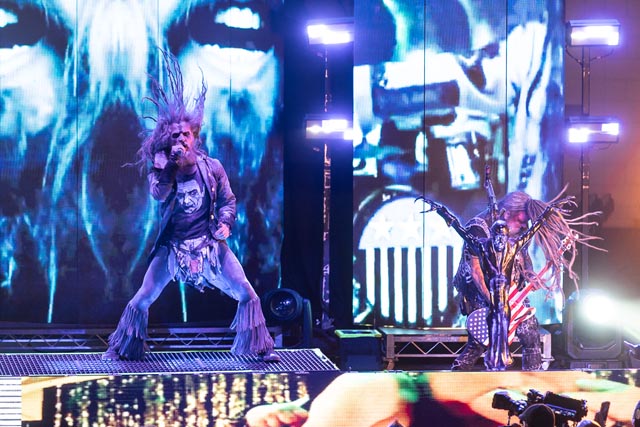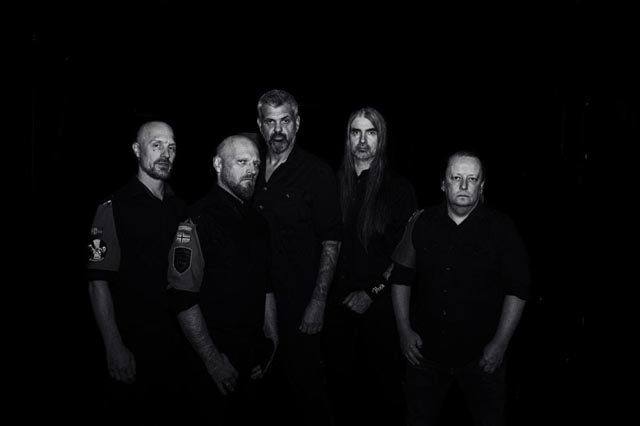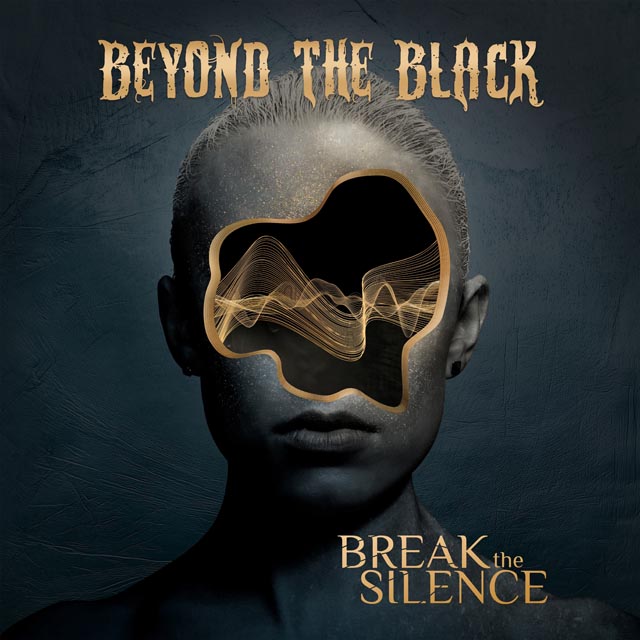 After getting his start in Canada, producer Jay Ruston moved to Los Angeles, and has since worked with everyone from The Donnas to Meatloaf. However, it’s his work on the long-awaited Anthrax album Worship Music that has everyone’s interest as of late. While the album was already recorded (produced by guitarist Rob Caggiano with the rest of the band), Ruston rerecorded the vocals once Joey Belladonna returned to the band. In an exclusive interview with Metal Insider, Ruston gave us insight into the process of finishing Worship Music following Dan Nelson’s departure, and his favorite songs from the album, which will finally be released on September 13. However, the talk wasn’t all about Anthrax, as Ruston also discussed his work with Steel Panther’s sophomore album.
After getting his start in Canada, producer Jay Ruston moved to Los Angeles, and has since worked with everyone from The Donnas to Meatloaf. However, it’s his work on the long-awaited Anthrax album Worship Music that has everyone’s interest as of late. While the album was already recorded (produced by guitarist Rob Caggiano with the rest of the band), Ruston rerecorded the vocals once Joey Belladonna returned to the band. In an exclusive interview with Metal Insider, Ruston gave us insight into the process of finishing Worship Music following Dan Nelson’s departure, and his favorite songs from the album, which will finally be released on September 13. However, the talk wasn’t all about Anthrax, as Ruston also discussed his work with Steel Panther’s sophomore album.
Talk to me about how you came to work on the Anthrax record.
Scott Ian did a guest guitar spot on the first Steel Panther record that I was producing. So he came to the studio, we hung out for a few hours and he played guitar on the tune. Then he called me a few months later to do some producing for his wife Pearl. So I ended up doing a couple little side projects for them including the Brian Posehn stuff when he did a couple metal tunes for his record. So up until six months ago Scott and I had just done a bunch of side projects. I was talking to him about Anthrax and at that point they had just done the Big 4 shows in Europe and he asked me to mix the live DVD, which I did. And we started talking about Joey and how he was back in the band and he wanted to know if I would produce [Joey’s] vocals because he enjoyed working with me.
Who produced the rest of the album?
Rob Caggiano, the lead guitar player, produced the record. The band co-produces everything but Rob was the main producer. He does all the engineering and obviously plays all the lead guitar stuff as well, and he’s amazing. I really couldn’t say enough about him. Without him it would have been impossible to finish this record because it was such a huge undertaking, you know sorting through the multiple versions of songs and just deciding what should be rerecorded and all that kind of stuff.
How much of the album was re-recorded, or was it just the vocals?
Quite a bit actually. Some of these songs had been written back in 2006, 2007, so some of that really early stuff was redone. Probably six or seven of the songs weren’t touched at all, musically we just maybe added a few bits and it was just vocals. But yeah there was three or four that we just did over from scratch. Charlie would do the drums in Chicago and then send those to us out here in L.A. and we would start adding guitar and solos and vocals from that point.
What was it like assuming a project that was already mostly completed?
It was definitely, at first, a bit of a technological challenge. All the guys in the band can record at home. They all have Pro Tools which is amazing and also challenging because you have to compile it all and sometimes not everybody is working in the same templates. So that was a bit of a challenge, but the songs were great and the tones were great, so the technical stuff wasn’t really bothering me. I just needed to piece it all together and make it work and a lot of that was already done. Like I said, Rob is really efficient and really picky about things so a lot of the songs were just ready to go I just had to stick Joey’s vocals on them and they were ready for mix.
Did you get to hear the versions with Dan Nelson? And did that even enter into when you were recording with Joey?
On a couple of the songs. I guess Dan didn’t write any of the stuff that we ended up still using, but just to get the melodies it was easier to use his version to hear where the vocal was going. Even though we kind of had creative license to change things and move melodies because Joey’s very creative and likes to come up with his own stuff. So I did reference it at times but I really tried to stay away from it because it’s so different. You know, he’s such a different singer and it was a different sound and it just, it was not what we were going for, so if there was a melody question I would just go to Scott or Frank or Charlie and ask ‘where do you want this to go?’ And they would even send me their own guide vocals sometimes and then Joey and I would take that and make it our own.
What did you think the main difference was between the two vocalists?
Stylistically Dan had more of a scream-ish type, Pantera approach to the songs. And Joey has definitely more of a melodic approach. With the original version, sometimes the melody didn’t shine through that much, so I felt like with Joey we were really going to be able to capture that side of it. It actually makes the songs catchier with Joey singing. So I’d say the main difference is just melodically the songs really opened. Joey’s not a screamer, it’s just not his voice. If you listen to classic Anthrax records from the 80s, you know he does what he does and that’s the sound of Anthrax. So that was my goal as the producer, to make it sound like classic Anthrax. Musically I thought a lot of it did, but was modern which was also amazing.
Do you have any favorite songs off the album so far?
Absolutely. I think “The Devil You Know” is a huge standout track. I don’t know if that’s going to be one of the first things they release or not (ed. note: It’s the first single for rock radio) but I personally love it. The opening track of the record “Earth On Hell.” I mean it’s a crazy blast beat classic thrash song, I really love that one. One of the newer songs that they kind of put together at the last minute was “In The End” and I really like that tune. We tried to approach the vocals almost the way like Bruce Dickinson would do vocals and obviously Joey doing what Joey does is similar to that anyway, and Joey’s a huge Dio fan as well, so I think you’ll hear some of those influences. His peers are his influences which are some of the best singers around.
“I’m Alive” is also ridiculously catchy.
That’s another song that I really like . My favorite metal bands were the ones with the great singers like Dickinson and Dio, so I tended to go in that direction with some of these vocals with Joey. Another great tune is “Crawl” which starts out really mellow and just kind of quiet and goes into this explosive, huge chorus and that was actually the first vocal that we did. Going into that tune the first night Joey was here in L.A., we actually just hung out for like six hours and just chatted about music and got comfortable with each other. We’d only met at live shows up to that point and hadn’t been in the studio so we just needed to get comfortable with each other and just kind of be buds. Once we got through that and I got him in the booth and he started singing that song, it just came together in like an hour and was sounding incredible. and I think around midnight or 1 in the morning we finished up and I emailed it to the band who presumably were all in bed but they were so psyched about hearing the first song with Joey back, they were calling me until 3 in the morning just flipping out. ‘I can’t believe how amazing this is, he sounds so good,‘ I mean it was just an amazing moment for everybody. The next morning I picked Joey up at his hotel to start our next session and I just showed him some of the texts and told him what everybody was saying and we just had big smiles on our faces, it was a really good moment.
How do you feel like this album fits in with the band’s legacy?
A lot of people are saying that this is one of their best records or right up there with the stuff in the 80s. That sounds like a lot of hype, but being a huge Anthrax fan and having every one of their records, I think that it’s true. I just think that the fans are going to be really blown away and they’re going to really love this record. The guys did a phenomenal job and they really spent a long time working on these tunes and crafting them. There are a couple songs that we didn’t have time to finish and a lot of people are wondering why there are only 10 songs on the record but it was just a matter of time. The label was like ‘look this has been long enough, you gotta get this thing out.’ So we have a couple songs back maybe we’ll release as singles later on down the road.
So are they going to put out an iTunes or retail version with an extra song?
Well the European and the Japanese version have bonus tracks but the European version has a cover song which is a really cool cover. I don’t know if they’ve publicly announced it yet either so I’ll hold off on that. But the Japanese version actually has an orchestral version of the song “Crawl.” We had a really amazing arranger come in and put this orchestral arrangement over the tune and then we remixed it featuring that more as opposed to some of the guitar and some of the small orchestral arrangements we had originally. It turned out amazing so that’s kind of a nice treat for the Japanese fans and hopefully it’ll be available here on iTunes as well because it’s a pretty cool alternate version.
That’s great. So give me a quick history of yourself and how you got into production.
I grew up near Detroit in Canada. I saw tons of concerts in the late 80s and 90s in Detroit which was an amazing time. Bands would come through town in groups of four and you’d just get these amazing line ups playing great clubs. I played bass in a bunch of different bands and toured around. I just started getting into recording and mentored under a producer named Jack Richardson near Toronto who produced all the Guess Who records and Bob Seger, Alice Cooper. And his son is Garth (GGGarth) Richardson who produced the first Rage Against The Machine record. I had those influences around me pretty early, so I spent about eight or nine years in Canada producing bands and climbing the ladder slowly. I got an opportunity to get a job at a studio in L.A. in 2002 or 2003, so I was able to get a work visa and come down here and immediately immersed myself in the L.A. scene and found bands. I have the strangest resume. I’ve worked with Wilson Phillips, I did a song with Leonard Cohen, and then I’ve obviously done a ton of metal stuff as well. I did a Meat Loaf record, I’ve worked on American Idol, whatever I could work on that would be interesting and something that I could learn from. I’ve also worked with great producers like Desmond Child and Peter Asher. So that led me to building my own studio, which was a great move because it’s better financially for the bands. We can do a lot of what we need to in big rooms but when it comes to the vocals and the mixing, we can do it at my own studio which is a lot more cost effective.
I think I’d be doing our readers a disservice if I didn’t ask you about Steel Panther.
I met Steel Panther five or six years ago through a band called Paperback Hero who I produced that used to play a lot with them. They were really good pals with Steel Panther and played them the stuff I’d done with them and they were really impressed. They didn’t have their deal with Universal yet; they just wanted to professionally record five or six original tunes. They were kind of tired of doing the covers and they wanted to integrate some of their own stuff into the comedy act. So we did the first record and then Universal decided to pick it up and that was great, it really opened up the whole world for them. I mean, in Europe they’ve just exploded. And just based on the success of the first record we decided to work together again on the second album. I actually just submitted it to the mastering studio today. We’re going to get it mastered this week and then we’ll sequence it next week. I think it’s going to come out October 18th.
So I’m assuming it’s stylistically and lyrically like the first one?
Yeah of course. I mean we didn’t stray too far. I would say that it’s probably a little more in depth lyrically than the first album. [laughs] You know, it [was] bang you over the head with instant comedy and there’s certainly some of those songs on this record. We’ve got a song called “I Fucked 17 Girls in a Row” and we have a song called “Hit Her in the Shitter Treat Her Like a Critter.” So there’s those obvious ones, but we have a song called “Just Like Tiger Woods” which is all about Tiger obviously and their sarcastic version of like how amazing he is and what an accomplishment it was what he did. [laughs] You know they kind of worship at the altar of what he was able to accomplish with his women. So there’s different subjects that were tackled. We just wanted the album to be a bit more diverse and it still has a comedy element, but we also wanted to just make a great rock record with great riffs, huge drums. Steel Panther is a throwback so it sounds like the 80s but it also sounds modern which we tried to do on the first record as well, but this one even more so. We just tried to make everything evolve: their musicianship, the vocals, the production, the mixing, so there was a lot of experimenting.
The first album we felt kind of pressured to have a lot of guests because Steel Panther constantly has people getting up on stage with them jamming. And the label wanted to capitalize on that, so we had a good seven or eight different celebrity singers on the first record, like Corey Taylor from Slipknot and a bunch of different people. But this time around we didn’t focus on that at all. If a celebrity wanted to get involved and came to us, of course we said yes but we kept it kind of slim. The intro to the record is kind of funny – it’s sort of a tribute to Motley Crue. On Shout at the Devil they had the “In the Beginning” narration, so we have a narration as well but it’s Dane Cook. We have a couple other guests but I’m going to keep those secret for now because I think we’re just gonna sort of let everybody figure it out on their own.
Cool. Anything you’re going to be working on in the near future?
I’ve got a few different things I’m looking at. There’s a band from Chicago that Charlie Benante actually introduced me to called Heavy the Fall that I really like, I’ve been talking to those guys. There’s a band on Roadrunner called Taking Dawn that I’ve been talking to a little bit. They’re demoing some material right now with Elvis Baskette and I might do a couple demos with them as well just to see how that goes. I do a lot of mixing as well, bands come to me just to have their records mixed too. Keeping busy.











